毕业综合实践任务书
- 格式:doc
- 大小:38.00 KB
- 文档页数:2
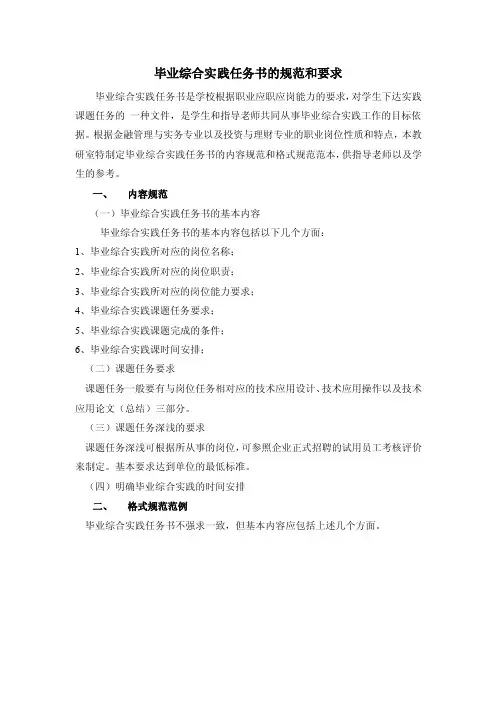
毕业综合实践任务书的规范和要求毕业综合实践任务书是学校根据职业应职应岗能力的要求,对学生下达实践课题任务的一种文件,是学生和指导老师共同从事毕业综合实践工作的目标依据。
根据金融管理与实务专业以及投资与理财专业的职业岗位性质和特点,本教研室特制定毕业综合实践任务书的内容规范和格式规范范本,供指导老师以及学生的参考。
一、内容规范(一)毕业综合实践任务书的基本内容毕业综合实践任务书的基本内容包括以下几个方面:1、毕业综合实践所对应的岗位名称;2、毕业综合实践所对应的岗位职责;3、毕业综合实践所对应的岗位能力要求;4、毕业综合实践课题任务要求;5、毕业综合实践课题完成的条件;6、毕业综合实践课时间安排;(二)课题任务要求课题任务一般要有与岗位任务相对应的技术应用设计、技术应用操作以及技术应用论文(总结)三部分。
(三)课题任务深浅的要求课题任务深浅可根据所从事的岗位,可参照企业正式招聘的试用员工考核评价来制定。
基本要求达到单位的最低标准。
(四)明确毕业综合实践的时间安排二、格式规范范例毕业综合实践任务书不强求一致,但基本内容应包括上述几个方面。
附:毕业综合实践任务书范例金融管理与实务专业毕业综合实践任务书毕业综合实践课题岗位名称:浙江省****银行信用卡中心客户经理毕业综合实践课题岗位职责:通过中心的系统培训,在师傅的指导下,完成信用卡销售岗位的客户资料的收集、客户拜访、签单以及客户资料管理工作。
毕业综合实践课题岗位能力要求:熟悉国内商业银行以及实习银行的信用卡相关知识;掌握几种主要贷记卡的产品优势;掌握信用卡营销的技巧;具备信用卡客户开拓能力和素质;具备客户资料管理能力;达到正式员工有效信用卡的发卡基本任务。
毕业综合实践课题名称:某市信用卡市场的现状和拓展策略分析(某市信用卡营销人力发展策略研究)毕业综合实践课题完成条件:学生具备一定的信用卡产品知识和营销知识以及技能;银行提供的产品有一定的优势,银行提供较为完善的培训机制。
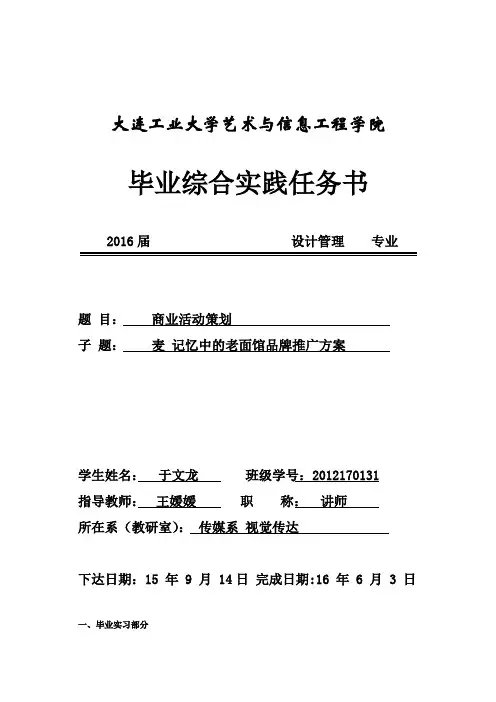

第1篇Task Title: Exploration and Analysis of the Impact of Social Media on Youth DevelopmentStudent Name: [Your Name]Student ID: [Your Student ID]Department: [Your Department]Major: [Your Major]Supervisor: [Supervisor’s Name]Date of Issue: [Date]Introduction:This comprehensive practice task aims to explore and analyze the impact of social media on the development of young people in today’s digital age. As the world becomes increasingly interconnected through digital platforms, it is crucial to understand the effects of social media on various aspects of youth development, including psychological, social, and academic domains. The task will involve both theoretical research and practical application, enabling students to synthesize knowledge from different disciplines and develop critical thinking skills.Task Objectives:1. To understand the historical and contemporary context of social media development.2. To analyze the psychological, social, and academic impacts of social media on youth.3. To evaluate the potential benefits and drawbacks of social media in the lives of young people.4. To develop practical strategies for promoting positive social media usage among youth.5. To enhance research, analytical, and communication skills through the completion of this task.Task Duration:The comprehensive practice task is expected to be completed within [X] weeks, starting from [Start Date] to [End Date].Task Structure:1. Literature Review (Weeks 1-2):- Conduct a thorough review of existing literature on social media and youth development.- Identify key theories, research findings, and debates in the field.- Synthesize the findings from various academic disciplines, such as psychology, sociology, and communication studies.2. Research Design (Weeks 3-4):- Define the research objectives and hypotheses.- Select appropriate research methods (e.g., surveys, interviews, case studies).- Develop a research instrument or protocol.- Seek approval from the relevant ethics committee if necessary.3. Data Collection (Weeks 5-6):- Implement the research design to collect data from a sample of young people.- Analyze the collected data using appropriate statistical or qualitative analysis techniques.- Ensure the confidentiality and ethical treatment of participants.4. Data Analysis and Interpretation (Weeks 7-8):- Analyze the data to identify patterns, trends, and relationships.- Interpret the findings in the context of existing literature and theories.- Discuss the implications of the findings for social media policy and practice.5. Report Writing (Weeks 9-10):- Write a comprehensive report summarizing the research process, findings, and conclusions.- Include an introduction, literature review, methodology, results, discussion, and conclusion sections.- Follow the formatting and citation guidelines provided by the department.6. Presentation and Defense (Weeks 11-12):- Prepare a presentation summarizing the research findings and their implications.- Present the findings to the supervisor and other relevant faculty members.- Defend the research findings and answer questions from the audience.Task Requirements:1. Literature Review:- A comprehensive literature review of at least 20 academic articles or books.- A clear and concise summary of the key findings and debates in the field.2. Research Design:- A detailed research proposal including objectives, hypotheses, methods, and ethical considerations.- Approval from the relevant ethics committee (if applicable).3. Data Collection:- A research instrument or protocol that is clear, unbiased, and appropriate for the research objectives.- A minimum of 50 completed research instruments or interviews.4. Data Analysis:- A clear and systematic analysis of the collected data.- Use of appropriate statistical or qualitative analysis techniques.- A detailed discussion of the findings.5. Report Writing:- A well-structured, comprehensive report following the department’s formatting and citation guidelines.- A clear, concise, and logical presentation of the research process, findings, and conclusions.6. Presentation and Defense:- A well-prepared presentation that effectively communicates the research findings.- A strong defense of the research findings and conclusions.Evaluation Criteria:1. The quality and depth of the literature review.2. The clarity and appropriateness of the research design.3. The thoroughness and accuracy of the data collection and analysis.4. The clarity, coherence, and organization of the report.5. The effectiveness of the presentation and defense.Submission Dates:1. Literature Review: [Submission Date]2. Research Proposal: [Submission Date]3. Data Collection Instrument/Protocol: [Submission Date]4. Data Analysis and Interpretation: [Submission Date]5. Final Report: [Submission Date]6. Presentation and Defense: [Presentation Date]Supervisor’s Responsibiliti es:- Provide guidance and support throughout the research process.- Review and provide feedback on the literature review, research proposal, data collection instrument/protocol, data analysis, and final report.- Attend the presentation and defense to ev aluate the student’s performance.Student’s Responsibilities:- Complete the comprehensive practice task within the specified time frame.- Communicate regularly with the supervisor regarding progress and any issues encountered.- Ensure the confidentiality and ethical treatment of participants.- Follow the department’s formatting and citation guidelines.Conclusion:This graduation comprehensive practice task will provide an excellent opportunity for students to delve into the complex relationship between social media and youth development. By completing this task, students will not only enhance their research and analytical skills but also contribute to the understanding of this critical issue in today’s society.第2篇Title: Exploring the Impact of Technological Advancements on Education: A Case Study of Smart Classroom ImplementationObjective:The primary objective of this comprehensive practice task is to enable students to apply their theoretical knowledge and skills in a practical setting. Through this project, students will gain hands-on experience in analyzing the impact of technological advancements, particularly smart classroom implementation, on the educational sector. This task aims to enhance critical thinking, problem-solving, and research skills while fostering a deeper understanding of the subject matter.Duration:The comprehensive practice task will be carried out over a period of 12 weeks, starting from [Insert Start Date] to [Insert End Date].Participants:This task is designed for [Insert Number] students of [Insert Department/Program Name], [Insert University Name].Task Overview:The comprehensive practice task will be divided into several phases, each focusing on different aspects of the project. The following is a detailed outline of the task:Phase 1: Literature Review (Weeks 1-2)- Students will conduct a thorough literature review on the impact of technological advancements on education, with a specific focus on smart classroom implementation.- Students will identify key theories, research findings, and debates related to the topic.- Students will develop a research question that will guide their project.Phase 2: Case Study Selection (Weeks 3-4)- Students will select a case study of a school or educationalinstitution that has implemented smart classrooms.- Students will analyze the selection criteria for their case study, ensuring it is relevant, accessible, and representative of the broader educational context.Phase 3: Data Collection (Weeks 5-7)- Students will collect data from the selected case study throughvarious methods, such as interviews, surveys, observations, and document analysis.- Students will ensure that their data collection methods are ethical, reliable, and valid.Phase 4: Data Analysis (Weeks 8-9)- Students will analyze the collected data, identifying patterns, trends, and relationships between technological advancements and educational outcomes.- Students will use appropriate statistical and qualitative analysis techniques to interpret their findings.Phase 5: Report Writing (Weeks 10-11)- Students will write a comprehensive report that includes an introduction, literature review, methodology, results, discussion, and conclusion.- The report should provide a clear and concise overview of the project, highlighting key findings and their implications for the educational sector.Phase 6: Presentation and Defense (Weeks 12)- Students will present their findings to a panel of faculty members and peers.- Students will be prepared to answer questions and defend theirresearch methodology and conclusions.Task Requirements:1. Literature Review:- A comprehensive literature review of at least 15 academic sources, including peer-reviewed articles, books, and conference papers.- A research question that clearly outlines the scope and objectives of the project.2. Case Study:- A detailed case study report that includes an introduction, methodology, results, discussion, and conclusion.- A minimum of 10 interviews with stakeholders (teachers, students, administrators) involved in the smart classroom implementation.3. Data Analysis:- A detailed analysis of the collected data, including statistical and qualitative findings.- A discussion of the implications of the findings for the educational sector.4. Report:- A well-structured, 20-page report that adheres to academic writing standards.- Proper citation of all sources used in the project.5. Presentation:- A PowerPoint presentation that effectively communicates theproject's objectives, methodology, results, and conclusions.- A clear and concise oral defense of the project's findings and methodology.Evaluation Criteria:1. Literature Review (20%): The quality and depth of the literature review, research question clarity, and relevance to the case study.2. Case Study (30%): The thoroughness of the case study, the quality of data collection and analysis, and the relevance of findings to the research question.3. Data Analysis (20%): The appropriateness of the analysis techniques, the accuracy of the findings, and the discussion of their implications.4. Report (20%): The overall quality of the report, including structure, clarity, and adherence to academic writing standards.5. Presentation and Defense (10%): The effectiveness of the presentation, the clarity of communication, and the ability to answer questions and defend the project.Submission and Deadlines:All tasks must be submitted to the designated dropbox or folder by the respective deadlines:- Literature Review and Research Question (Week 2):- Case Study Report (Week 11):- Data Analysis and Report (Week 11):- Presentation and Defense (Week 12):Additional Information:- Students are encouraged to seek guidance from their faculty advisor throughout the project.- Regular progress reports should be submitted to the faculty advisor at the end of each phase.- Any ethical concerns or issues should be addressed immediately withthe faculty advisor or the university's ethics committee.By completing this comprehensive practice task, students will not only enhance their academic and professional skills but also contribute valuable insights to the ongoing discussion on the role of technology in education.。

毕业综合实践任务书网络方案设计专业电子信息工程技术班级()电子1101学生
姓名:()
一、课题名称:
通信机房智能温控系统。
二、原始资料要求:
可编程序控制器基础知识、可编程序控制器的硬件结构、技术教材,C语言教材,相关元器件资料,keil C51、Proteus7、Protel99SE 等软件。
三、课题要求:
实物制作基于DS18B20的单片机测温散热系统;学生应具备较好的电子技术、电气控制技术、PLC、电子线路CAD及单片机等知识;在课题中,能综合运用专业所学知识来分析问题、解决问题,以提高工程实践能力。
四、课题内容:
(直流供电部位),线路图。
五、课题完成时间:
2014年1月10日至2014年4月12日。
指导教师:
教研室主任:
系主任:。
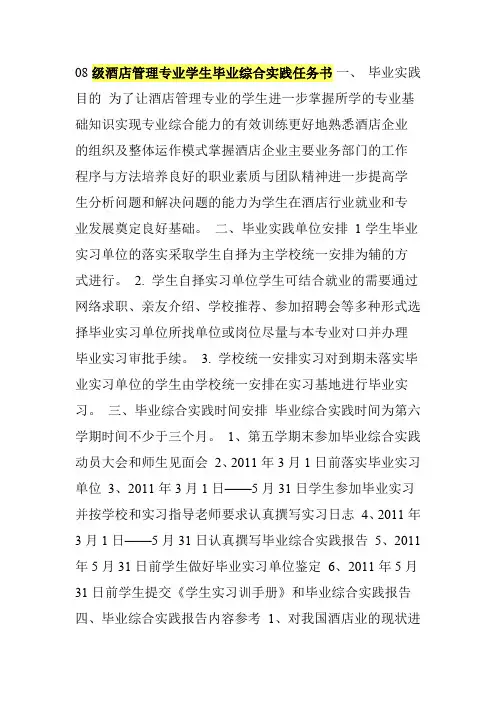
08级酒店管理专业学生毕业综合实践任务书一、毕业实践目的为了让酒店管理专业的学生进一步掌握所学的专业基础知识实现专业综合能力的有效训练更好地熟悉酒店企业的组织及整体运作模式掌握酒店企业主要业务部门的工作程序与方法培养良好的职业素质与团队精神进一步提高学生分析问题和解决问题的能力为学生在酒店行业就业和专业发展奠定良好基础。
二、毕业实践单位安排1学生毕业实习单位的落实采取学生自择为主学校统一安排为辅的方式进行。
2. 学生自择实习单位学生可结合就业的需要通过网络求职、亲友介绍、学校推荐、参加招聘会等多种形式选择毕业实习单位所找单位或岗位尽量与本专业对口并办理毕业实习审批手续。
3. 学校统一安排实习对到期未落实毕业实习单位的学生由学校统一安排在实习基地进行毕业实习。
三、毕业综合实践时间安排毕业综合实践时间为第六学期时间不少于三个月。
1、第五学期末参加毕业综合实践动员大会和师生见面会2、2011年3月1日前落实毕业实习单位3、2011年3月1日——5月31日学生参加毕业实习并按学校和实习指导老师要求认真撰写实习日志4、2011年3月1日——5月31日认真撰写毕业综合实践报告5、2011年5月31日前学生做好毕业实习单位鉴定6、2011年5月31日前学生提交《学生实习训手册》和毕业综合实践报告四、毕业综合实践报告内容参考1、对我国酒店业的现状进行分析2、对实习酒店企业的现状和所从事岗位的基本职责和要求进行分析3、岗位对从业人员知识、技能、素质的要求分析4、酒店各个部门岗位实习的心得体会5、酒店职业生涯的规划。
五、成绩考核毕业综合实践共12个学分其中毕业实习占总成绩的70毕业综合实践报告占总成绩的30。
毕业实习与毕业综合实践报告实行百分制双及格方可取得毕业综合实践成绩。
不及格者要重修或重写。
成绩考核如下一毕业实习成绩评分满分100分1毕业实习申请占10 2. 毕业实习日志占20 3毕业实习单位评价占30 4指导教师评价占30 5参加毕业综合实践动员大会10 二毕业综合实践报告成绩评分满分为100分由指导老师视学生写作态度和写作质量评分。
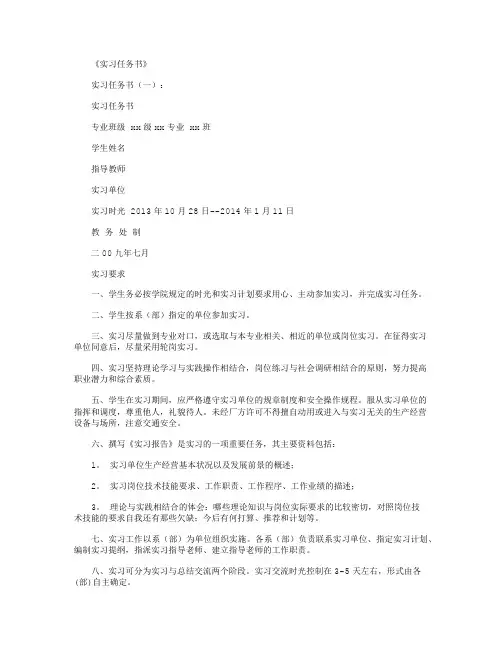
《实习任务书》实习任务书(一):实习任务书专业班级 xx级xx专业 xx班学生姓名指导教师实习单位实习时光 2013年10月28日--2014年1月11日教务处制二00九年七月实习要求一、学生务必按学院规定的时光和实习计划要求用心、主动参加实习,并完成实习任务。
二、学生按系(部)指定的单位参加实习。
三、实习尽量做到专业对口,或选取与本专业相关、相近的单位或岗位实习。
在征得实习单位同意后,尽量采用轮岗实习。
四、实习坚持理论学习与实践操作相结合,岗位练习与社会调研相结合的原则,努力提高职业潜力和综合素质。
五、学生在实习期间,应严格遵守实习单位的规章制度和安全操作规程。
服从实习单位的指挥和调度,尊重他人,礼貌待人。
未经厂方许可不得擅自动用或进入与实习无关的生产经营设备与场所,注意交通安全。
六、撰写《实习报告》是实习的一项重要任务,其主要资料包括:1。
实习单位生产经营基本状况以及发展前景的概述;2。
实习岗位技术技能要求、工作职责、工作程序、工作业绩的描述;3。
理论与实践相结合的体会:哪些理论知识与岗位实际要求的比较密切,对照岗位技术技能的要求自我还有那些欠缺;今后有何打算、推荐和计划等。
七、实习工作以系(部)为单位组织实施。
各系(部)负责联系实习单位、指定实习计划、编制实习提纲,指派实习指导老师、建立指导老师的工作职责。
八、实习可分为实习与总结交流两个阶段。
实习交流时光控制在3-5天左右,形式由各(部)自主确定。
九、实习期满由实习单位、实习指导老师、辅导员和各系(部)根据学生的遵纪守法(25%)、安全操作(10%)、完成(劳动)实习任务(35%)、完成实习总结撰写任务(15%)、团结协作(15%),作出评价,并按参考标准平分,系(部)的综合评定取实习单位、指导教师、辅导员的平均分。
十、《实习报告书》由各系(部)负责回收存档,并将评定成绩上报教务处。
指导老师(签名)年月日教研室主任(签名)年月日系主任(签名)年月日实习岗位实习工种填表日期实习评价意见实习任务书(二):毕业实习任务书根据环境监测与治理技术专业毕业实习大纲制订本任务书。
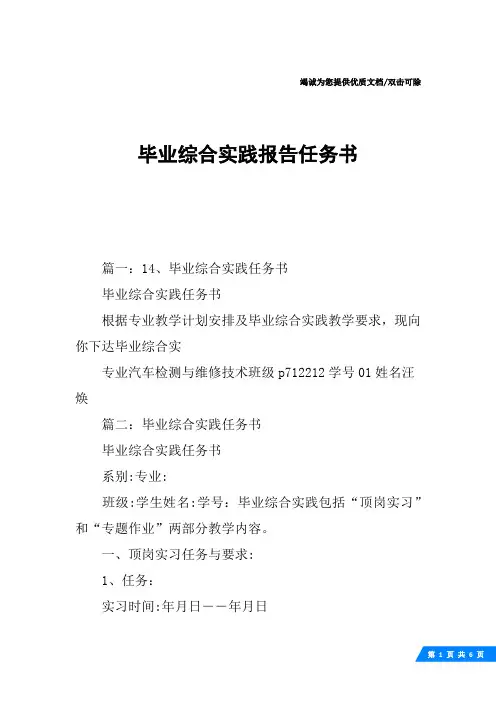
竭诚为您提供优质文档/双击可除毕业综合实践报告任务书
篇一:14、毕业综合实践任务书
毕业综合实践任务书
根据专业教学计划安排及毕业综合实践教学要求,现向你下达毕业综合实
专业汽车检测与维修技术班级p712212学号01姓名汪焕
篇二:毕业综合实践任务书
毕业综合实践任务书
系别:专业:
班级:学生姓名:学号:毕业综合实践包括“顶岗实习”和“专题作业”两部分教学内容。
一、顶岗实习任务与要求:
1、任务:
实习时间:年月日――年月日
实习导师:兼职指导教师:校内指导教师:
2、要求:
(1)在兼职指导教师的指导下,完成本任务书确定的实习内容,
做好实习单位布置的其他工作任务。
(2)在顶岗实习期间,要严格按照《安全作业规程》的要求进行
实习,遵守实习单位的各项规章制度,杜绝生产、交通等各方面安全。
(3)每天认真填写《顶岗实习日志》。
(4)在校内指导教师的指导下,收集与《顶岗实习报告》相关的
第一手资料,完成《顶岗实习报告》的撰写任务。
(5)学生运用所学专业知识对顶岗实习的工作实践进行总结和应用,禁止写成工作流水帐。
(6)《顶岗实习报告》不少于4000字,占毕业综合实践总成绩70%。
二、专题作业任务与要求:
1、任务:
2、要求:
(1)专题作业是学生通过顶岗实习对专业知识、专业技能的进一步熟悉、掌握、应用和拓展的一个综合性论述,。
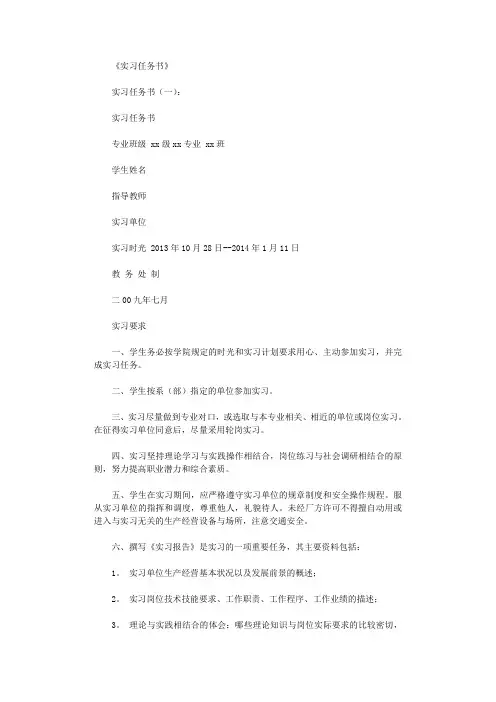
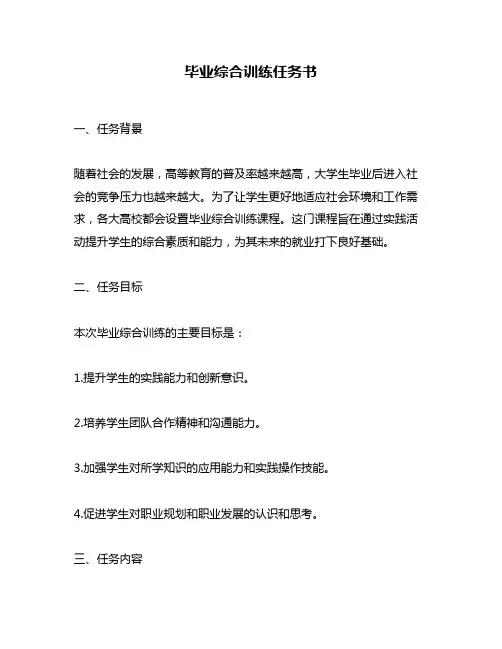
毕业综合训练任务书一、任务背景随着社会的发展,高等教育的普及率越来越高,大学生毕业后进入社会的竞争压力也越来越大。
为了让学生更好地适应社会环境和工作需求,各大高校都会设置毕业综合训练课程。
这门课程旨在通过实践活动提升学生的综合素质和能力,为其未来的就业打下良好基础。
二、任务目标本次毕业综合训练的主要目标是:1.提升学生的实践能力和创新意识。
2.培养学生团队合作精神和沟通能力。
3.加强学生对所学知识的应用能力和实践操作技能。
4.促进学生对职业规划和职业发展的认识和思考。
三、任务内容本次毕业综合训练主要包括以下内容:1.项目策划与管理:针对某一具体问题或需求,要求学生自行组建团队并进行项目策划与管理,包括项目计划、资源调配、风险评估等方面。
2.实践操作与技术应用:根据项目需求,学生需要掌握一定的实践操作技能和相关技术应用知识,例如软件开发、数据分析等。
3.团队合作与沟通协调:学生需要在团队中扮演不同角色,与其他成员进行有效的沟通协调,共同完成项目任务。
4.职业规划和发展:在完成项目任务的同时,学生需要思考自己的职业规划和发展方向,并制定相应计划。
四、任务要求1.组建团队:每个学生需要自行组建一个团队,团队人数不少于5人。
每个团队需确定一个负责人,并提交团队成员名单。
2.项目选题:每个团队需要确定一个具体问题或需求作为项目选题,并提交项目计划书。
选题范围不限,可以是社会热点问题、企业实际需求等。
3.实践操作:根据选题需求,学生需要掌握一定的实践操作技能和相关技术应用知识。
可以选择自己熟悉的领域或者新领域进行探索。
4.成果展示:每个团队需要提交一份完整的项目报告和演示PPT,并进行现场演示。
报告内容包括项目背景、目标、计划、实施过程、成果和总结等方面。
五、任务评估本次毕业综合训练的评估主要包括以下几个方面:1.项目策划与管理能力:包括项目计划、资源调配、风险评估等方面。
2.实践操作与技术应用能力:根据选题需求,掌握一定的实践操作技能和相关技术应用知识。
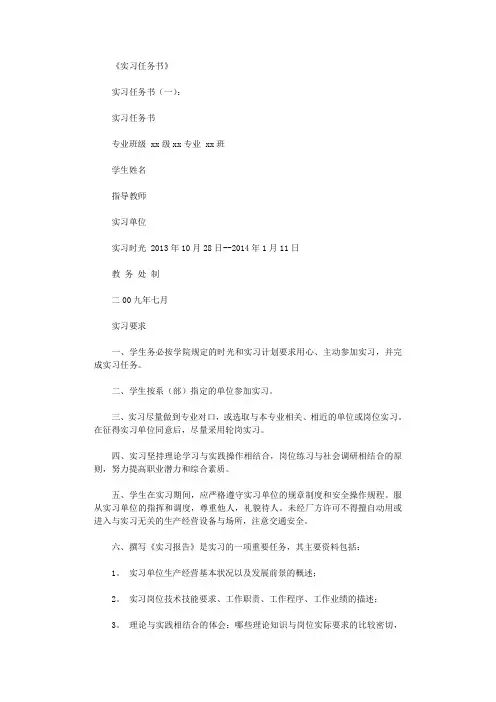
《实习任务书》实习任务书(一):实习任务书专业班级 xx级xx专业 xx班学生姓名指导教师实习单位实习时光 2013年10月28日--2014年1月11日教务处制二00九年七月实习要求一、学生务必按学院规定的时光和实习计划要求用心、主动参加实习,并完成实习任务。
二、学生按系(部)指定的单位参加实习。
三、实习尽量做到专业对口,或选取与本专业相关、相近的单位或岗位实习。
在征得实习单位同意后,尽量采用轮岗实习。
四、实习坚持理论学习与实践操作相结合,岗位练习与社会调研相结合的原则,努力提高职业潜力和综合素质。
五、学生在实习期间,应严格遵守实习单位的规章制度和安全操作规程。
服从实习单位的指挥和调度,尊重他人,礼貌待人。
未经厂方许可不得擅自动用或进入与实习无关的生产经营设备与场所,注意交通安全。
六、撰写《实习报告》是实习的一项重要任务,其主要资料包括:1。
实习单位生产经营基本状况以及发展前景的概述;2。
实习岗位技术技能要求、工作职责、工作程序、工作业绩的描述;3。
理论与实践相结合的体会:哪些理论知识与岗位实际要求的比较密切,对照岗位技术技能的要求自我还有那些欠缺;今后有何打算、推荐和计划等。
七、实习工作以系(部)为单位组织实施。
各系(部)负责联系实习单位、指定实习计划、编制实习提纲,指派实习指导老师、建立指导老师的工作职责。
八、实习可分为实习与总结交流两个阶段。
实习交流时光控制在3-5天左右,形式由各(部)自主确定。
九、实习期满由实习单位、实习指导老师、辅导员和各系(部)根据学生的遵纪守法(25%)、安全操作(10%)、完成(劳动)实习任务(35%)、完成实习总结撰写任务(15%)、团结协作(15%),作出评价,并按参考标准平分,系(部)的综合评定取实习单位、指导教师、辅导员的平均分。
十、《实习报告书》由各系(部)负责回收存档,并将评定成绩上报教务处。
指导老师(签名)年月日教研室主任(签名)年月日系主任(签名)年月日实习岗位实习工种填表日期实习评价意见实习任务书(二):毕业实习任务书根据环境监测与治理技术专业毕业实习大纲制订本任务书。
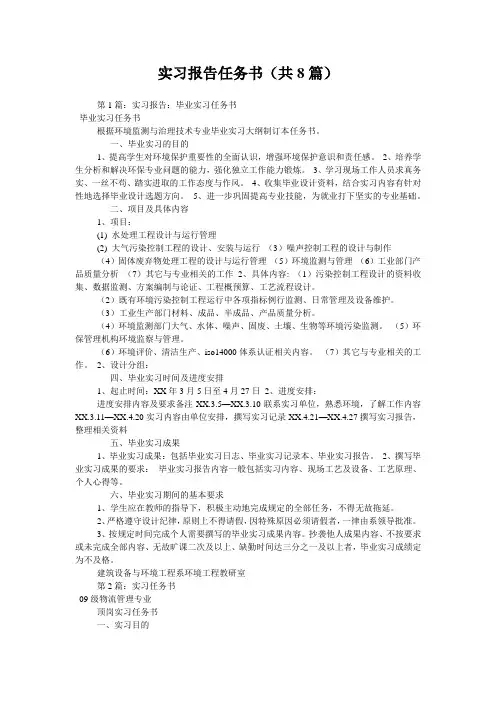
实习报告任务书(共8篇)第1篇:实习报告:毕业实习任务书毕业实习任务书根据环境监测与治理技术专业毕业实习大纲制订本任务书。
一、毕业实习的目的1、提高学生对环境保护重要性的全面认识,增强环境保护意识和责任感。
2、培养学生分析和解决环保专业问题的能力,强化独立工作能力锻炼。
3、学习现场工作人员求真务实、一丝不苟、踏实进取的工作态度与作风。
4、收集毕业设计资料,结合实习内容有针对性地选择毕业设计选题方向。
5、进一步巩固提高专业技能,为就业打下坚实的专业基础。
二、项目及具体内容1、项目:(1) 水处理工程设计与运行管理(2) 大气污染控制工程的设计、安装与运行(3)噪声控制工程的设计与制作(4)固体废弃物处理工程的设计与运行管理(5)环境监测与管理(6)工业部门产品质量分析(7)其它与专业相关的工作2、具体内容: (1)污染控制工程设计的资料收集、数据监测、方案编制与论证、工程概预算、工艺流程设计。
(2)既有环境污染控制工程运行中各项指标例行监测、日常管理及设备维护。
(3)工业生产部门材料、成品、半成品、产品质量分析。
(4)环境监测部门大气、水体、噪声、固废、土壤、生物等环境污染监测。
(5)环保管理机构环境监察与管理。
(6)环境评价、清洁生产、iso14000体系认证相关内容。
(7)其它与专业相关的工作。
2、设计分组:四、毕业实习时间及进度安排1、起止时间:XX年3月5日至4月27日2、进度安排:进度安排内容及要求备注XX.3.5—XX.3.10联系实习单位,熟悉环境,了解工作内容XX.3.11—XX.4.20实习内容由单位安排,撰写实习记录XX.4.21—XX.4.27撰写实习报告,整理相关资料五、毕业实习成果1、毕业实习成果:包括毕业实习日志、毕业实习记录本、毕业实习报告。
2、撰写毕业实习成果的要求:毕业实习报告内容一般包括实习内容、现场工艺及设备、工艺原理、个人心得等。
六、毕业实习期间的基本要求1、学生应在教师的指导下,积极主动地完成规定的全部任务,不得无故拖延。
GDGM-QR-03-074-B/1广东工贸职业技术学院毕业综合实践(设计)任务书商务谈判中的语言艺术所属系应用外语专业商务英语年级09商英1学生姓名朱琳学号0905155指导教师杨国民2012年02 月22 日毕业综合实践(设计)课题商务谈判中的语言艺术一、课题背景(包括目的、意义、专业知识的应用和职业岗位能力需要):一、课题背景(包括目的、意义、专业知识的应用和职业岗位能力需要):目的:通过调查,更深入地了解做商务谈判的基本要求与其就业前景。
意义:随着我国市场经济的发展和对外开放的进一步扩大,特别是加入WTO后,商务谈判的作用越来越突出。
商务谈判中语言运用的成功与否,对谈判的进程与结果起着举足轻重的作用。
通过分析当今社会商务谈判现状,使自己更清楚自己的就业方向。
专业知识的应用:商务谈判专业知识,国际贸易知识,商务函电。
职业岗位能力需要:观察力强,了解商务实体的内行语言,了解外贸流程,一定的英语能力。
二、课题工作内容与预期结果(具体工作内容,主要解决的问题、解决方案,预期结果):二、课题工作内容与预期结果(具体工作内容,主要解决的问题、解决方案,预期结果):具体的工作内容:分析商务谈判员现状以及要求;分析商务谈判员的语言艺术;分析商务谈判员就业前景。
主要解决问题:1、了解商务谈判员的从业要求2、了解商务谈判员的工作性质3、明确自身是否适合做商务谈判员解决方案:根据自己的情况再确定方向,再脚踏实地努力奋斗。
预期效果:达到自己所订立的目标。
三、毕业综合实践(设计)工作计划时间段工作内容1-3周4-6周7-9周10-11周12周订立课题题目;写提纲、任务书。
调查,收集资料。
整理,归纳分析资料,开始写论文。
修改并完善论文,制作PPT。
准备答辩资料,实习汇报,课题成果答辩。
起止工作时间1-11周预计答辩时间12周指导教师意见:签名:年月日。
毕业综合实践任务书姓名:班级:专业:财务管理学号:岗位名称:会计助理岗位职责:1、根据总帐会计做好的会计凭证进行数据录入工作,做到认真、仔细、准确。
2、协助出纳完成银行票据的结算工作。
3、协助总帐会计参与存货、固定资产等清查、盘点工作。
4、协助会计部负责人做好公司往来帐户的清理工作。
5、完成每月进项发票的认证、发票开具工作。
6、完成发票的购、销工作。
7、月末纳税申报,及时抄、报税。
8、统计、财政、外管等外协单位的资料报送工作。
9、作好与本单位税务专管人员的沟通工作,并将问题及时反馈总帐会计,及时处理。
10、不断学习钻研,提高岗位技能,作好总帐会计的助手。
11、领导交办的其他工作。
岗位能力要求:1、学习能力2、创新能力3、协调能力4、沟通能力5、实际操作能力6、职业判断能力7、应变能力8、管理和控制能力毕业综合实践课题名称:浅析会计环境对会计发展的影响课题任务要求:(一)岗位操作技能要求1、熟悉会计基础知识、现金管理知识。
2、熟练操作计算机及财务软件。
3、有效强的规划能力、计划能力及实施能力。
4、能够熟练编制各类财务报表。
(二)毕业设计(论文)撰写要求1.选题与专业一致,具有实践运用价值;2.阅读20篇左右与选题相似的的文献资料;3.做到论文不抄袭,不应付,在老师指导下认真修改、完善;4.文档格式符合学院规定。
(三)时间安排与要求2015年11月18日前,确定选题方向,下达任务书并上传实践平台;2015年12月7日前,完成开题报告并上传实践平台;2016年1月4日前,完成论文初稿并上传实践平台;2016年5月31日前,论文修改及定稿;2016年6月10日前,完成结题申请及其他文档。
指导教师:_______ 职称:会计师指导教师签名:________。
特色农产品推广毕业综合实践任务书本次社会实践目的:一是了解现实农业发展趋势,掌握基本的工作方法,为以后进入社会创造有利条件。
二是增强自身责任感,确立自己正确的人生志向与就业取向,把自己所学的专业与社会接轨。
来到单位工作得到了单位同志的支持,在工作之余听取同志们的工作经验,丰富自己的工作阅历。
实践中主要从事的工作是整理与打印材料,从整理材料中得知现在新农村建设的快速发展给广大农民带来的巨大利益,使广大农民感受到国家政策是从农民所需,农民所想,而制定的,真正的为百姓着想,为百姓谋福利。
从此也可以想到世界性经济对中国的影响,中国政府采取四万亿的政策,也是从广大人民的根本利益出发而制定的,所以从此也可以进一步增强本人拥党爱国的思想,积极努力的学习为党和人民贡献自己的一份力量。
在此期间我还参加了一次由单位领导主持的党员学习活动,使自己在一次增强思想认识,增强为人民服务的责任感,对于单位主持的学习包括《中国共产党新党章》,和《论中国共产党员修养》,从中使自己领会到如何作为一名年轻的预备党员,如何发挥自己的主观能动性来最大程度的为人民服务。
中国共产党是我国的执政党,如何领导广大群众带领广大人民群众谋发展是我党的重要工作任务,所以能够尽快尽早的适应工作环境,是当代大学生的新的任务和发展需要。
本次农业实践收获如下:一、正确对待理论学习与实际工作在工作中会让自己发现自己的很多理论知识无法完全融入工作当中,往往会有不知所措的感觉,这种现象的根本原因是自己在学习中没有把理论学通,没有完全将学习务实,没有在学习的过程中不断巩固,没有做到知行统一:另一个主要原因没有应用好学校的有利资源,学习科目单一,无法将各项工作有序的衔接起来。
这些都是自己在下学期的学习生活中应该改进的,不断的完善自己。
二、正确的择业观念通过进一步的工作和学习,发现当今的农业不断的向机械化和自动化方向发展,为广大求业者提供很大的就业前景,从自身出发,我所从事的是制药工程,其中一项便是农药的开发与研制,努力向这个方向发展不仅可以为自己提供就业机会而且还可以造福百姓,为祖国贡献自己的一份力。
【导语】搜集的范⽂“实习任务书模板【三篇】”,供⼤家阅读参考,查看更多相关内容,请访问实习报告频道。
【⼀】 实习任务书、指导书、实习报告 ⽂秘专业毕业实习计划 ⼀、实习⽬的 透过专业实习,进⼀步巩固学⽣所学的专业知识和专业技能,使其熟悉企事业单位中⽂秘专业的基本操作流程和业务状况,培养学⽣独⽴开展⼯作、分析问题、解决实际问题的潜⼒,为其成为⼀名合格的能在企事业单位担任相关职位⼯作的⾼等复合应⽤型⼈才打下良好的基础。
⼆、实习时光及具体安排 (⼀)实习时光:为期10周,具体实习时光为第6学期1-8周,第9周周⼀返校报到。
(⼆)实习事项安排 1、学⽣进⾏分组,按⼩组指定实习指导教师。
2、进⾏专业实习动员。
专业负责⼈发放实习教师和实习学⽣的联系表;交代实习相关资料,说明实习起⽌时光,布置实习任务,说明实习材料的填写⽅式;发放实习资料。
3、第5学期期末,实习指导教师和本组学⽣开碰⾯会。
4、第6学期开学,学⽣确定实习单位。
学⽣在进⼊到实习单位之前,要⽤电⼦邮件向指导教师发送基本状况:班级、姓名、学号、⼿机号码、家⾥电话、邮箱、实习单位名称、地址、电话、联系⼈等。
以上状况如有变动应及时与指导教师联系。
5、第6学期1-8周,学⽣⾃主实习,期间和实习指导教师随时持续联系,每周上交《实习周记》给指导⽼师检查,并汇报实习状况,⼀周不交者严肃处理。
经常关注校园,有些要求和通知会在上发布。
6、第6学期第9周周⼀,实习⽣返校。
7、第10周,开展实习交流,学⽣上交相应材料,教师评定实习等级。
8、第11周,实习材料汇总上交。
三、实习单位安排 1、学⽣应在企事业单位中选取与⾃我所学专业相关的岗位开展实习活动,实习单位要求选取具有必须规模、制度健全、能满⾜实习要求的企事业单位。
2、原则上由学⽣⾃⾏联系确定实习单位,需要开具介绍信的能够向系办领取。
四、实习要求 实习⽣要按照实习⼤纲和实习教学计划的要求,按时参加和完成实习任务。
实习任务书【三篇】实习任务书【三篇】实习任务书【一】顶岗实习任务书一、实习目的顶岗实习是学生学完教学计划规定的全部课程后的教学环节,是一个理论联系实际,增加感性认识的必要途径,是锻炼和提高学生组织管理潜力,培养分析、解决实际问题潜力的和独立工作潜力的一项重要措施,是培养高技能应用型人才的重要手段。
透过实习使学生到达以下目的:加深对所学专业课程的理解,增强综合运用专业知识的潜力。
1。
对物流业与国民经济的关系有较为清晰的认识和理解;2。
对物流企业组织机构与职能,以及物流企业与金融机构、政府主管部门和用户等方面的关系有进一步了解;3。
对物流企业的全部经营活动,有一完整的掌握;熟悉专业工作的资料,提高运用理论知识解决实际问题的潜力。
1、透过参加物流企业经营管理业务实践,对企业的投资决策、前期工作、仓储、配送、报关等环节有一个全面了解。
个性应重点掌握其中前期工作和业务流程等重点资料2、使学生对物流人才素质的要求有深刻的认识。
二、实习时光和方式1、实习时光:第三学年下学期初,第1~20周,共计20周。
2、实习方式:学生实习采取分散实习方式。
由学生根据实际状况自行联系实习单位。
3、可供选取的实习单位有:仓储配送类企业;运输类企业;国际货代与报关企业等。
4、实习初期,学生应与实习单位的有关负责人一道共同协商制定实习计划和实习资料,实习期间应与实习单位员工一样,参与所在单位的正常业务工作。
5、实习期间,重点熟悉所在实习单位业务工作。
三、实习资料及要求学生参加顶岗实习应以提高自身综合技能为主,综合运用所学专业理论知识解决实际工作中出现的问题,是大学期间所学专业知识融会贯通的过程,也是学生最终走向社会之前的一次检验。
学生主要实习任务如下:(一)基本要求1、顶岗实习是学生完成全部专业课程学习后,走上实际工作岗位之前接触社会,检验自身专业素质的良好机会。
学生应利用这次机会充分了解行业背景,认识今后所从事的专业工作的性质、特点和要求。
【导语】©⽆忧考⽹搜集的范⽂“实习任务书【四篇】”,供⼤家阅读参考,查看更多相关内容,请访问实习报告频道。
【⼀】 ⼀、实习名称及实习现场要求 1.实习名称 顶岗实习 2.实习现场要求 ⼯程建设单位、施⼯企业、招标代理机构、房地产开发企业、⼯程造价咨询机构、⼯程建设监理咨询公司、设计院等企业。
单位。
⼆、实习⽬的及要求 1.实习⽬的 顶岗实习是在完成所有理论课程教学后,进⾏地⼀次全⾯和系统的综合实习,是学⽣⾛向⼯作岗位前不可缺少的重要环节,学⽣就应严肃认真对待此次实习。
(1)透过顶岗实习加深学⽣对所学专业在⼟⽊⼯程中的地位和作⽤的认识,使学⽣更加明确今后所从事的⼯作范畴和应承担的职责,为顺利进⼊⼯作岗位打下坚实的基础。
(2)透过顶岗实习培养学⽣严肃认真的⼯作态度、深⼊细致的研究⽅法、正确务实的劳动观念和先进的⼯程造价管理理念。
(3)学⽣在现场实习过程中,透过对建筑物从材料置备到最后建成全过程中的造价管理的观察、认识和分析,使学⽣拓宽专业视野、丰富实践知识、了解专业的现状及发展趋势。
(4)透过顶岗实习收集毕业设计或毕业论⽂所需的全套资料,为毕业设计或毕业论⽂撰写创造条件。
2.实习⽅式及要求 (1)实习⽅式 顶岗实习⽅式采⽤学⽣⾃我联系实习单位和学校统⼀安排两种⽅式进⾏。
实习指导教师将在实习期间进⾏巡回检查、指导。
①学⽣⾃我联系:学⽣可到将来可能参加⼯作的单位实习,或是联系到⾃我家乡的单位就近实 习。
联络⼏个同学⼀齐实习,也可单独实习,学校⿎励学⽣⾃我联系实习单位。
②学校统⼀安排:由指导教师联系到实习单位后,统⼀分组安排实习,学⽣务必服从安排。
(2)实习要求 ①顶岗实习是学院正常的教学环节,成绩不合格属未完成规定学业。
②在顶岗实习期间,学⽣务必遵纪守法,严格遵守学院和实习单位的各项规章制度,不得从事或参与有损⼤学⽣形象、学院声誉、社会公德的活动。
③顶岗实习学⽣务必勤奋⼯作、刻苦学习、尊重他⼈、团结同学,遵守职业道德,*完成学院和⽤⼈单位下达的实习、⽣产任务。
毕业综合实践任务书
系别: 专业:
班级: 学生姓名: 学号:
毕业综合实践包括“顶岗实习”和“专题作业”两部分教学内容。
一、顶岗实习任务与要求:
1、任务:
实习时间: 年月日――年月日
实习导师: 兼职指导教师:校内指导教师:
2、要求:
(1)在兼职指导教师的指导下,完成本任务书确定的实习内容,做好实习单位布置的其他工作任务。
(2)在顶岗实习期间,要严格按照《安全作业规程》的要求进行实习, 遵守实习单位的各项规章制度,杜绝生产、交通等各方面安全。
(3)每天认真填写《顶岗实习日志》。
(4)在校内指导教师的指导下,收集与《顶岗实习报告》相关的
第一手资料,完成《顶岗实习报告》的撰写任务。
(5)学生运用所学专业知识对顶岗实习的工作实践进行总结和应用,禁止写成工作流水帐。
(6)《顶岗实习报告》不少于4000字,占毕业综合实践总成绩70%。
二、专题作业任务与要求:
1、任务:
2、要求:
(1)专题作业是学生通过顶岗实习对专业知识、专业技能的进一步熟悉、掌握、应用和拓展的一个综合性论述,其内容可以是专业发展的探索和研究、专业项目、专业课题、专业调研、专业发明创造等。
专题作业是毕业生综合性的独立作业,是整个教学过程中不可缺少的重要环节。
(2)每个学生在第6学期顶岗实习期间,要认真完成专题作业。
专题作业不少于3000字,占毕业综合实践总成绩30%。
若专题作业中包含有图纸等,可附在专题作业之后。